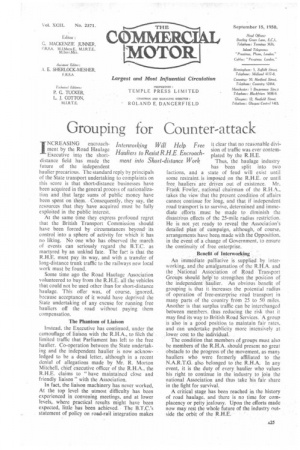Grouping for Counter-attack
Page 27

If you've noticed an error in this article please click here to report it so we can fix it.
Interworking Will Help Free Hauliers to Resist R.H.E. Encroachinto Short-distance Work NCREASI NG encroachment by the Road Haulage Executive into the short haulier precarious. The standard reply by principals of the State transport undertaking to complaints on this score is that short-distance businesses have been acquired in the general proce.zs of nationalization and that large sums of public money have been spent on them. Consequently, they say, the resources that they have acquired must be fully exploited in the public interest.
At the same time they express profound regret that the British Transport Commission should have been forced by circumstances beyond its control into a sphere of activity for which it has no liking. No one who has observed the march of events can seriously regard the B.T.C. as martyred by an unkind fate. The fact is that the R.H.E. must pay its way, and with a transfer of long-distance trunk traffic to the railways new local work must be found.
Some time ago the Road Haulage Association volunteered to buy from the R.H.E. all the vehicles that could not be used other than for short-distance haulage. This offer was, of course, ignored, because acceptance of it would have deprived the State undertaking of any excuse for running free hauliers off the road without paying them compensation.
The Phantom of Liaison Instead, the Executive has continued, under the camouflage of liaison with the R.H.A., to filch the limited traffic that Parliament has left to the free haulier. Co-operation between the State undertaking and the independent haulier is now acknowledged to be a dead letter, although in a recent denial of allegations made by Mr. R. Morton Mitchell. chief executive officer of the R.H.A., the R.H.E. claims to "have maintained close and friendly liaison" with the Association.
In fact, the liaison machinery has never worked, At the top level the utmost difficulty has been experienced in convening meetings, and at lower levels, where practical results might have been expected, little has been achieved. The B.T.C.'s statement of policy on road-rail integration makes it clear that no reasonable division of traffic was ever contemplated by the R.H.E.
'Thus, the haulage industry has been split into two factions, and a state of feud will exist until some restraint, is imposed on the R.H.E. or until free, hauliers are driven out of existence. Mr. Frank Fowler, national chairman of the R.H.A., takes the view that the present condition of affairs cannot continue for long, and that if independent road transport Is to survive, determined and immediate efforts must be made to diminish the disastrous effects of the 25-mile radius restriction. He is not yet ready to reveal the Association's detailed plan of campaign, although, of course, arrangements have been, made with the Opposition, in the event of a change of Government, to ensure the continuity of free enterprise.
Benefit of Interworking An immediate palliative is supplied by interworking, and the amalgamation of the R.H.A. and the, National Association of goad Transport Groups should help to strengthen the position of the independent haulier. An obvious benefit of grouping is that it increases the potential radius of operation of free-enterprise road transport in many parts of the country from 25 to 50 miles. Another is that surplus traffic can be interchanged between members, thus reducing the risk that it may find its way to British Road Services. 'A group is also in a good position to maintain fair rates, and can undertake publicity more intensively at lower cost to the individual.
The condition that members of groups must also be members of the R.H.A. should present no great obstacle to the progress of the movement, as many hauliers who were formerly affiliated to the N.A.R.T.G. also belonged to the R.H.A. In any event, it is the duty of every haulier who values his right to continue in the industry to join the national Association and thus take his fair share in the fight for survival.
A critical stage has been reached in the history of road haulage, and there is no time for complacency or petty jealousy. Upon the efforts made now may rest the whole future of the industry outside the orbit of the R.H.E.




































































































